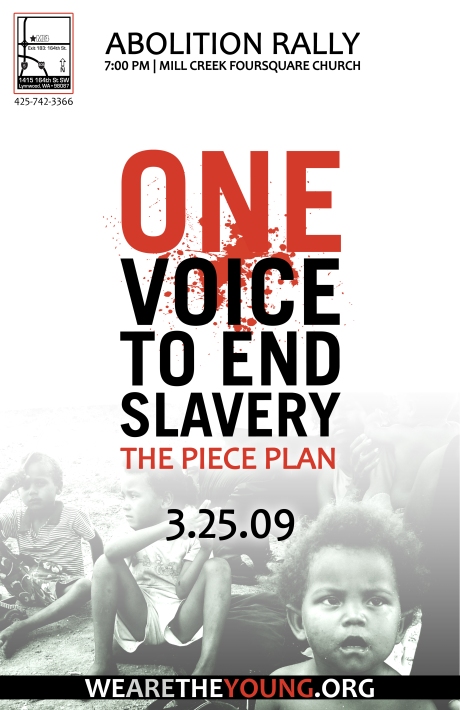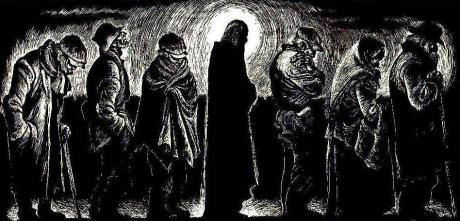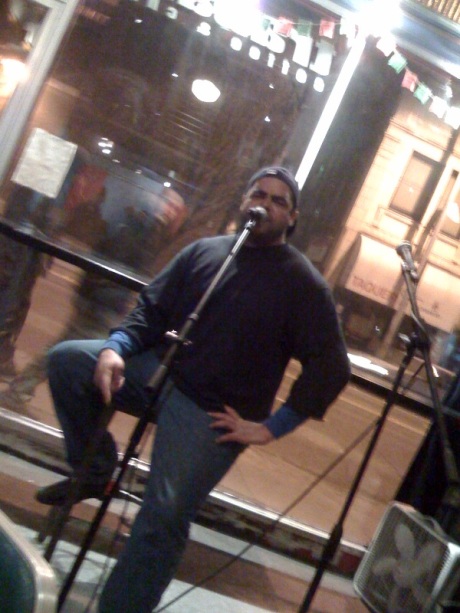Here is the declaration that was presented at a press conference on Monday at Nickelsville (a long-term outdoor encampment)-
it lists how to help those outside survive, and end homelessness in 8 points. our support with voice and action is needed to change the status of the non-housed in our city (& everywhere actually), PLEASE READ ON and help by spreading the word!>>>
———————————
Declaration of a State of Emergency in 2010 by and for Homeless People
in Seattle & King County
Four years into Seattle/King County’s Ten Year Plan to End
Homelessness, our numbers are at an all time high. Our shelters are
overcrowded, noisy, at times infested with bed bugs, and often consist
of little more than a mat on a floor. We have no place to store our
possessions, and so must carry them with us. Pushed onto the street in
the early morning hours, we are hidden from sight and forced to stay
on the move. We are unwelcome in your public spaces, and are harassed
by your police and private security when we stop to rest.
At least a third of us sleep outside, where we are subject to trespass
and arrest. Our belongings are routinely stolen and destroyed by
government workers who are “just doing their jobs.” When we camp in
cars, we are targeted for citations and our vehicles are towed and
impounded. When we come together to form safe, dignified communities,
we are threatened with arrest and our supporters are bullied with
threats and fines.
We die, on average, at 48 years of age. Nine of us have died by
suicide this year.
We are the working poor who have been set up to fail. Our low wages,
work insecurity, lack of healthcare, overcrowded and unaffordable
housing, and unreliable transportation leave us vulnerable to economic
disaster.
We are the expendable, the dehumanized, the written off, and the
devalued. We are the sick, the disabled, the mentally ill, and the
addicted. We are the too poor, too uneducated, too old, and too
unemployable to matter. We are the human wreckage of a broken system
that denies its responsibility and blames us for our existence.
IT SHOULDN’T BE LIKE THIS. Homeless people deserve and are entitled to
the same protections as our housed brothers and sisters: a right to
health and housing, freedom from violence and stereotyping, the
ability to keep our families and loved ones together, and the tools to
move ahead and thrive.
In 2010, worse will come. King County, at the close of this year,
reduced human services funding by 46%. Youth shelter funding was
eliminated. Food banks funding was slashed to zero at a time of record
demand. The state budget crisis promises disaster. General Assistance
for the Unemployable, the State Housing Trust Fund, drug treatment
funding, and Basic Health Care are all to be eliminated.
OUR STATE OF EMERGENCY MUST BE RECOGNIZED. The Ten Year Plan to End
Homelessness is a fraud. The true causes of homelessness – rent
increases, gentrification, evictions, and the failure of the market to
provide affordable housing – aren’t dealt with, measured, or touched.
For every unit of affordable housing produced under the plan, three to
four have been lost to market forces.
Top leadership of the Plan has tokenized the participation of homeless
people, and has fallen deaf to our pleas for safety, shelter, and
community. The percentage of homeless people who are sheltered should
be a plan benchmark.
We can no longer wait for the expanded survival services we need today
while our “leaders” promise housing in the future.
HELP US TO SURVIVE AND SOLVE HOMELESSNESS:
1. EXPAND SURVIVAL SERVICES. Since the Ten Year Plan began,
homelessness has grown while emergency shelter supply has held steady
and funding for day centers has declined. Stop pretending and meet the
need with clean, simple decent shelter.
2. SUPPORT SELF-HELP HOMELESS GROUPS (like SHARE). When we run our own
shelters, we cost-effectively offer maximum dignity and community to
residents. Stable city funding will help us built community-wide
solutions to meet the growing need.
3. PROVIDE A PERMANENT SITE FOR NICKELSVILLE. We need a site big
enough for a non-moving eco village of up to 1,000. There are over
seventy sites in Seattle that will work and only one is needed.
4. COMPLETE THE HOMELESS REMEMBRANCE PROJECT to honor people who have
died while homeless. The Tree of Life in Victor Steinbrueck Park and
Leaves of Remembrance in sidewalks throughout the County will serve as
reminders to us all that homeless lives have value.
5. STOP THE CRIMINALIZATION. Citations for trespass violations,
panhandling, and sitting on sidewalks clog our courts and punish the
poor with fines and jail time while denying us due process under law.
6. EXPAND TREATMENT. Drug and alcohol treatment services save lives
and money. Punitive policies undermine public health goals and deepen
the misery and isolation that often underlies addiction.
7. PROVIDE TRANSPORTATION. As downtown gentrification has pushed more
services outside the free ride zone, access to bus transportation has
become a barrier to overcoming homelessness. Homeless people should
receive free bus passes.
8. SUPPORT AFFORDABLE HOUSING. Strategies to cost-effectively increase
supply must be prioritized over big-ticket infrastructure projects and
sports arenas. Encourage market solutions that don’t let excellent get
in the way of good. We need housing. Now.
This Declaration was written by people from, and is supported by the
SHARE, WHEEL, Nickelsville and Real Change Communities.
REAL CHANGE is Seattle’s 15-year-old Street Newspaper and a cross-
class Organizing Project to unite people in working for social
justice.
2129 2nd Ave, Seattle, WA 98121
Web: realchangenews.org Email: organizer@realchangenews.or
WHEEL (Women’s Housing, Equality and Enhancement League) is an
organizing effort of homeless and formerly homeless women.
P.O. Box 2548, Seattle WA 98118-0334
Web: sharewheel.org Email: wheelorg.@yahoo.com
Homeless remembrance project http://www.homeless project.org
SHARE (Seattle Housing and Resource Effort) is an organization of
homeless and formerly homeless men and women working together to
survive and solve homelessness.
P.O. Boz 2548, Seattle WA 98118 (206) 448-7889
Web: http://www.sharewheel.org
NICKELSVILLE is presently a small organized encampment seeking to
become an eco-village of up to 1,000 homeless men, women and families
located on a permanent site with services.
(206) 450-9136
Web Nickelsvilleseattle.org Email: Scott@nickelsvilleseattle.org












